The Power to Solve Climate Change
post by Liron · 2019-09-12T18:37:32.672Z · LW · GW · 32 commentsContents
This is Part V of the Specificity Sequence
The Climate Crisis
Thiel's Definite vs. Indefinite Attitude
Definite Climate Change Solutions
United Nations Framework Convention on Climate Change
Y Combinator's Request for Carbon Removal Technologies
Project Drawdown
Bret Victor's List
Tesla
What About Cap And Trade?
Indefinite Climate Change Solutions
Personal Behavior Change
"Offsetting" Your Own Impact
The Government-Oversight Model
The No-Government-Oversight Model
None
32 comments
This is Part V of the Specificity Sequence [LW · GW]
Companion post: Examples of Examples [LW · GW]
Most people agree that climate change is a big problem we should be solving, but couldn't tell you what specifically "solving climate change" means. By the end of this post, I promise you'll know what specifically "solving climate change" means... and also what it doesn't mean.
The Climate Crisis
The first step is knowing the key specific facts of the climate crisis. I admit I couldn't recite them accurately before writing this post. Here's a quick summary from Tomorrow and NASA (both great friendly explanations worth checking out):
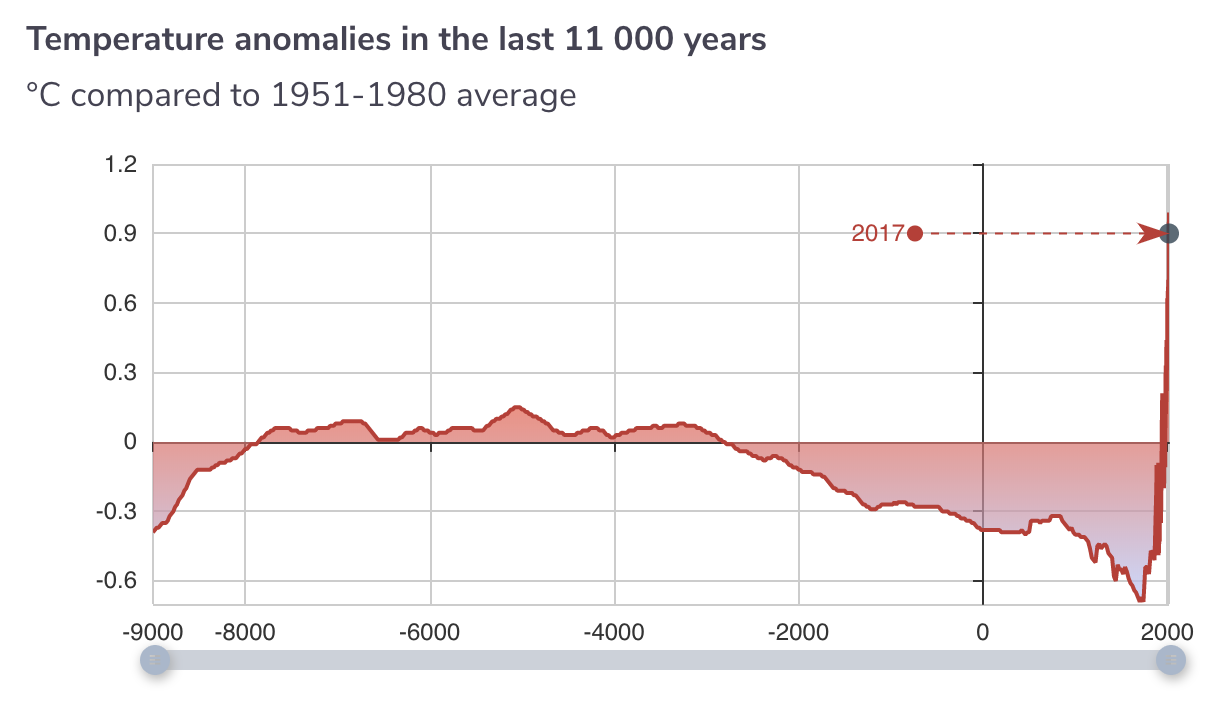
- Earth's average temperature has shot up by 1°C in the last 50 years.
- The causal link from greenhouse gas emissions to Earth's rising temperature has been well established.
- On a 1M-year timescale, Earth's temperature has been fluctuating plus or minus a few degrees tops, so this 1°C change is a big fluctuation.
- We're predicting it to be as high as a 6°C warming by 2100, so it's actually a huge fluctuation.
- The current rate of temperature rise is a whopping 20 times faster than the rate at which Earth's temperature historically fluctuates, so it's actually an oh, SHIT fluctuation.
Thiel's Definite vs. Indefinite Attitude
In Peter Thiel's smart and highly original book Zero to One: Notes on Startups, or How to Build the Future, the chapter called "You Are Not A Lottery Ticket" centers around the concept of definite vs. indefinite attitudes:

Under the heading "Can You Control Your Future?" Thiel writes:
You can expect the future to take a definite form or you can treat it as hazily uncertain. If you treat the future as something definite, it makes sense to understand it in advance and work to shape it. But if you expect an indefinite future ruled by randomness, you'll give up on trying to master it.
Indefinite attitudes to the future explain what's the most dysfunctional in our world today. Process trumps substance: when people lack concrete plans to carry out, they use formal rules to assemble a portfolio of various options. This describes Americans today. In middle school, we're encouraged to start hoarding "extracurricular activities". In high school, ambitious students compete even harder to appear omnicompetent. By the time a student gets to college, he's spent a decade curating a bewilderingly diverse résumé to prepare for a completely unknowable future. Come what may, he's ready—for nothing in particular.
A definite view, by contrast, favors firm convictions. Instead of pursuing many-sided mediocrity and calling it "well-roundedness," a definite person determines the one best thing to do and then does it. [...] This is not what young people do today, because everyone around them has long since lost faith in a definite world.
When you have a definite attitude, you do stuff like:
- Claim that skill is more important than luck (or you can "make your own luck")
- Back a political candidate who has a long-term plan you believe in
- Start a company to make something [LW · GW] people want
- Work on megaprojects
- Invest actively in companies and expect a high return
While if you have an indefinite attitude, you do stuff like:
- Claim that success "seems to stem as much from context as from personal attributes" (a quote from Malcolm Gladwell's Outliers)
- Follow election polls to see which candidate is the most popular this week
- Graduate from business school and become a consultant
- Work on a bunch of smaller projects to become well-rounded and keep your options open
- Invest passively in a portfolio of stocks and bonds and expect low returns
You've probably guessed why Thiel's distinction is relevant to our exploration of specificity: Activating your specificity powers is basically the same thing as switching from an indefinite to a definite attitude.
When a startup lacks a specific story about how they'll create value for specific users, but they're working frantically to build a product anyway, they're revealing an attitude of what Thiel calls indefinite optimism: "The future will be better than the present, even though I can't tell you specifically how." Consistently with my post about judging startup ideas [LW · GW], Thiel says:
A company is the strangest place of all for an indefinite optimist: why should you expect your own business to succeed without a plan to make it happen?
(I consider it ironic that Thiel's Founders Fund has an investment in Golden, but it was a relatively small amount and unrepresentative of their normal decision-making.)
Thiel says that the western world had an era of definite optimism beginning in the 17th century and lasting through to the 1950s and '60s:
In 1914, the Panama Canal cut short the route from Atlantic to Pacific. [...] The Interstate Highway System began construction in 1956, and the first 20,000 miles of road were open for driving by 1965. [...] NASA's Apollo Program began in 1961 and put 12 men on the moon before it finished in 1972.
But, he says, the shared attitude in the US and Europe has now shifted to indefinite:
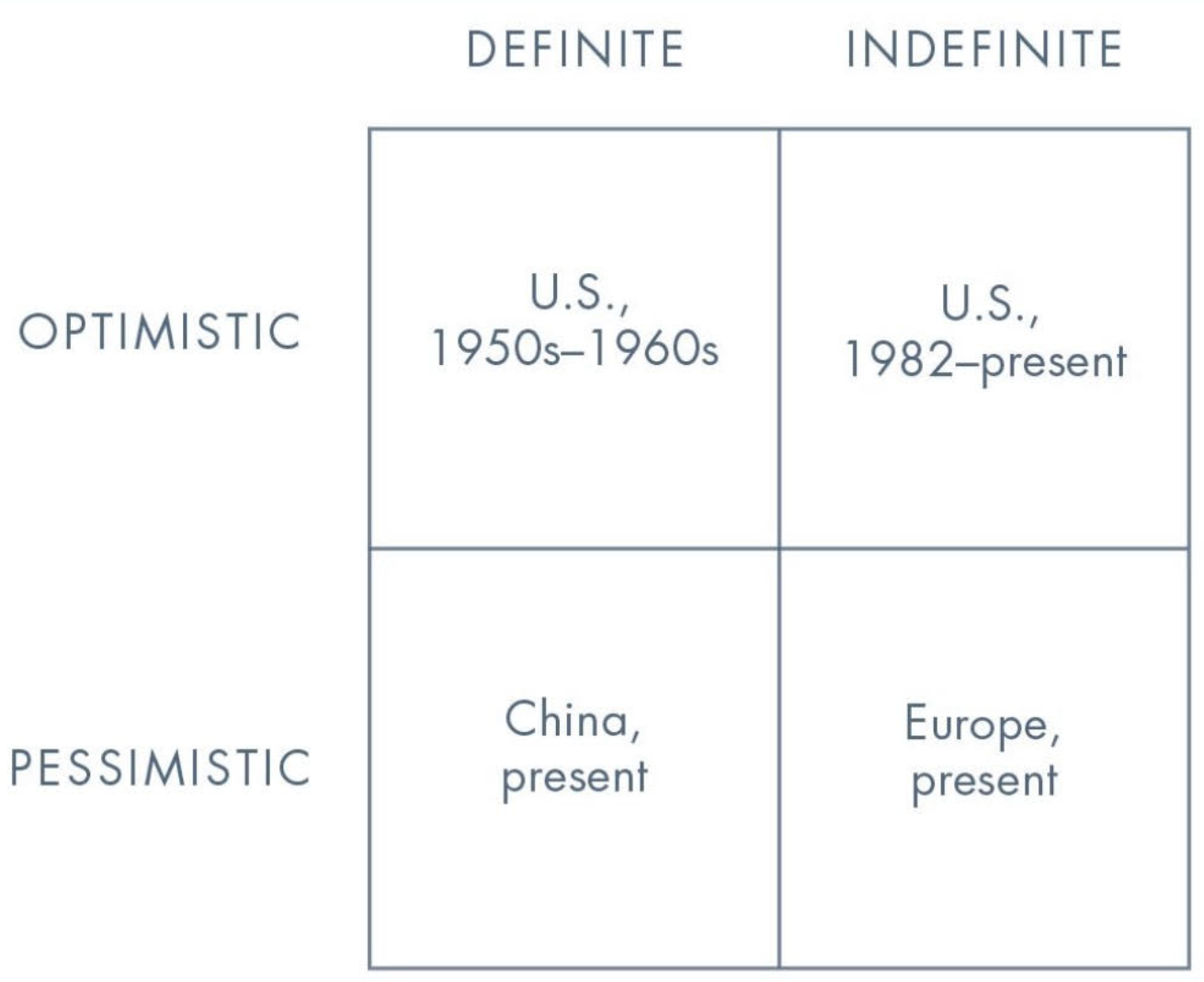
The government used to be able to coordinate complex solutions to problems like atomic weaponry and lunar exploration. But today, after 40 years of indefinite creep, the government mainly just provides insurance; our solutions to big problems are Medicare, Social Security, and a dizzying array of other transfer payment programs.
In order to solve the climate crisis, I think we desperately need a cultural shift back to definite optimism. We need specific plans for solving our problems.
Definite Climate Change Solutions
Here are all the efforts I've heard of that are aiming at definite solutions to climate change.
United Nations Framework Convention on Climate Change
The United Nations Framework Convention on Climate Change (UNFCCC) is an international treaty whose stated objective is:
To stabilize greenhouse gas concentrations in the atmosphere at a level that would prevent dangerous anthropogenic interference with the climate system.
The UNFCCC feels like it comes from an alternate universe containing an adequate civilization sane enough to coordinate top-down solutions in the face of existential threats. In fact, it was ratified in 1994 of the actual timeline we're in by all member states of the United Nations and the European Union.
Under the UNFCCC's guidelines, all 197 parties meet every year and negotiate more specific international treaties. This is how we got the 1997 Kyoto Protocol (84 signatories) and the even-more-of-a-big-deal 2016 Paris Agreement (195 signatories).
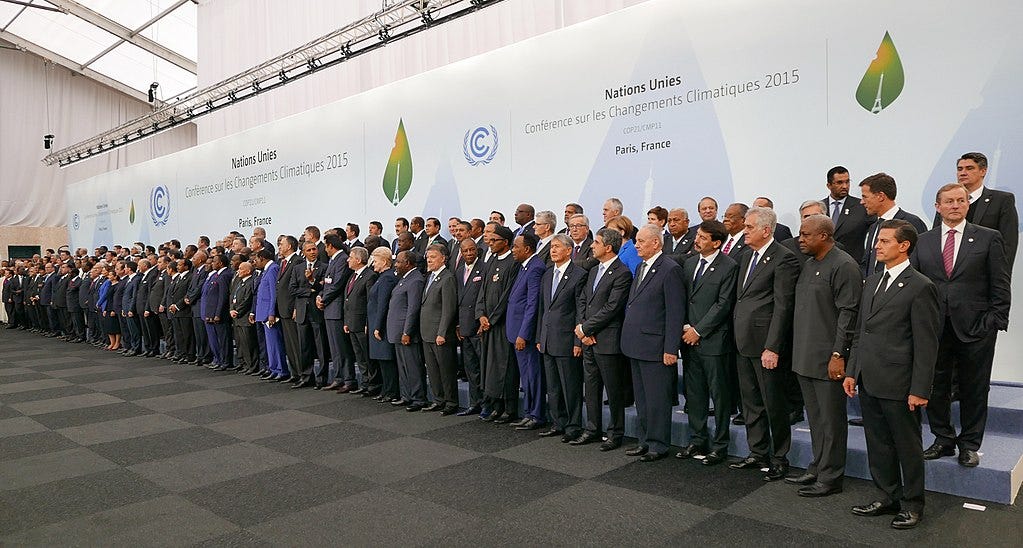
But while the UNFCCC provides definite per-country targets for greenhouse gas reduction, it doesn't provide definite mechanisms or incentives for countries to hit the targets.
At one point, the Kyoto Protocol tried to fix the problem by defining binding commitments on 37 countries to reduce their greenhouse gas emissions by specific amounts, but only seven of them ratified that part.
The Paris Agreement doesn't even attempt anything as definite as that:
The Paris Agreement has a 'bottom up' structure in contrast to most international environmental law treaties, which are 'top down', characterized by standards and targets set internationally, for states to implement. Unlike its predecessor, the Kyoto Protocol, which sets commitment targets that have legal force, the Paris Agreement, with its emphasis on consensus-building, allows for voluntary and nationally determined targets. [Source]
And:
There will be only a "name and shame" system or as János Pásztor, the U.N. assistant secretary-general on climate change, told CBS News (US), a "name and encourage" plan. As the agreement provides no consequences if countries do not meet their commitments, consensus of this kind is fragile. A trickle of nations exiting the agreement could trigger the withdrawal of more governments, bringing about a total collapse of the agreement. [Source]
So guess what? Countries haven't been trying that hard to live up to the UNFCCC's targets:
A pair of studies in Nature have said that, as of 2017, none of the major industrialized nations were implementing the policies they had envisioned and have not met their pledged emission reduction targets, and even if they had, the sum of all member pledges (as of 2016) would not keep global temperature rise "well below 2 °C". Source
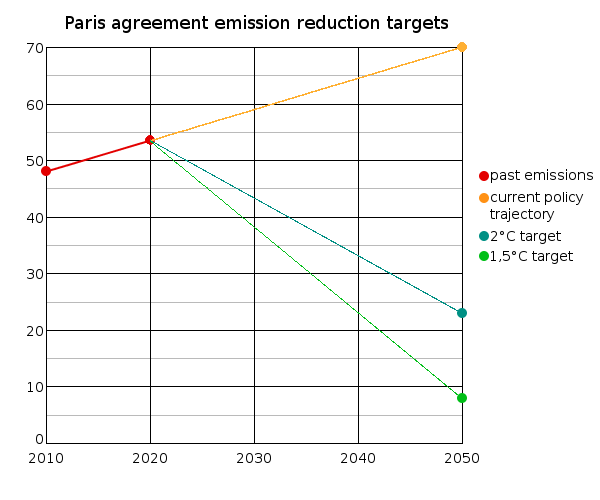
Ouch.
But on a positive note, we have this international framework-treaty, the UNFCCC, which is at least trying to define specific targets. That's what the start of a good definite solution looks like, no matter how bad the follow-through has been so far.
Y Combinator's Request for Carbon Removal Technologies
In 2018, Sam Altman and Y Combinator announced an ongoing Request for Carbon Removal Technology Startups. They're interested to fund and advise anyone working in the space, whether it's a for-profit company or nonprofit research. (Consider applying!)

While the 25-year-old UNFCCC has always been focused on renewable energy and reducing greenhouse gas emissions, YC's Request for Startups focuses entirely on removing greenhouse gases from the atmosphere, because we're now in a more advanced phase of the climate crisis than we used to be:
"Phase 1" of climate change is reversible by reducing emissions, but we are no longer in "Phase 1." We're now in "Phase 2" and stopping climate change requires both emission reduction and removing CO2 from the atmosphere. "Phase 2" is occurring faster and hotter than we thought. If we don't act soon, we'll end up in "Phase 3" and be too late for both of these strategies to work.
YC names four major categories of frontier technologies which they admit "straddle the border between very difficult to science fiction", but are nevertheless worth exploring:
In a 2012 Stanford lecture, Thiel lamented that these kinds of definite proposals are outside the Overton window:
It’s worth noting that something like geoengineering [projects to save the environment] would fall in the definite optimistic quadrant. Maybe we could scatter iron filings throughout the ocean to induce phytoplankton to absorb carbon dioxide. Potential solutions of that nature are not even remotely in the public debate. Only radically indefinite things make for acceptable discourse.
But YC's RFS announcement was met with positive headlines like "Carbon removal tech is having a moment" and got 1187 points on Hacker News. While, sadly, it didn't get much attention at all outside the tech community, it's fair to say that using frontier technologies to remove carbon from the atmosphere now is acceptable discourse.
Project Drawdown
Project Drawdown evaluates specific solutions to the climate change problem by modeling their expected impact on greenhouse gas reduction. Here's their ranking of 80 solutions.
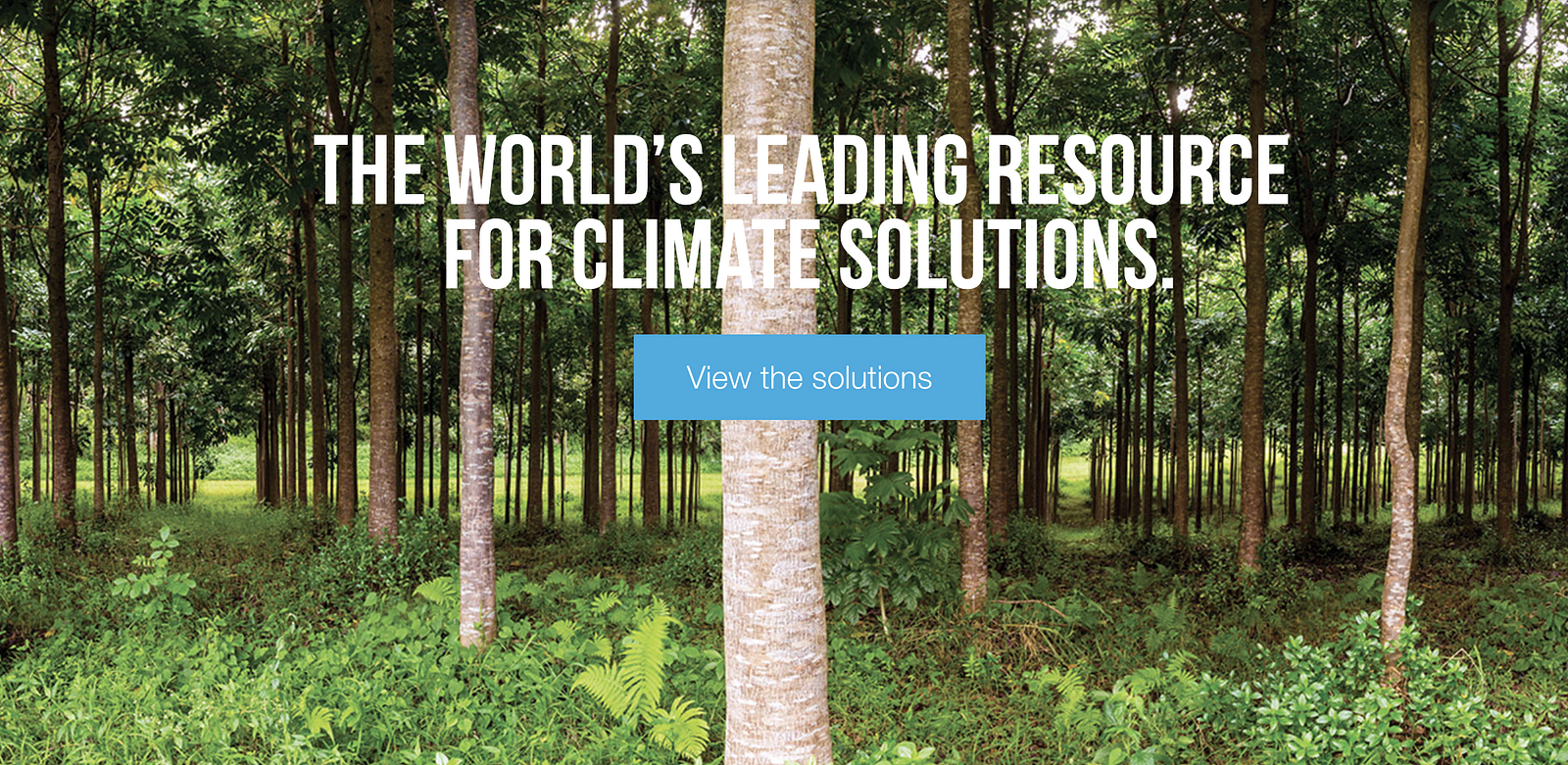
Can you guess what's the #1 solution they recommend as highest impact in terms of total reduction in atmospheric greenhouse gases?
...
...
...
Ok here are the top five:
Refrigerant management?! I totally thought the top project was going to be nuclear, but nuclear is only #20. Apparently it's expensive and slow, and not just because of regulations, but also because of technical and economic factors. I'm still optimistic that a nuclear Manhattan Project is a good investment, but I guess it's not a slam dunk compared to the other top-20 projects.
Bret Victor's List
Bret Victor's nicely-designed What Can A Technologist Do About Climate Change? page is a thoughtful list of areas for definite action:
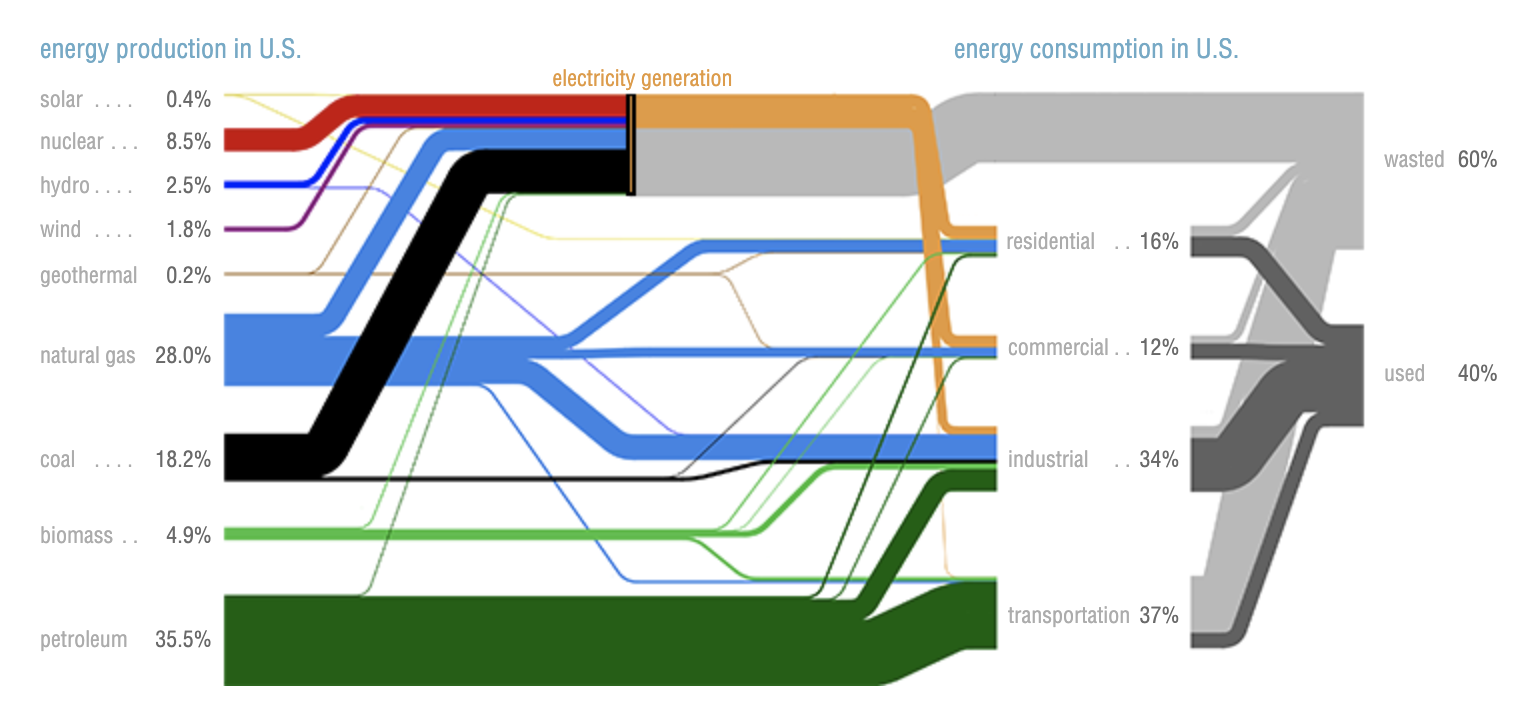
- Public and private investment
- Implementation details of efficient clean energy production
- Transporting energy
- Coordinating energy consumption
- Energy-efficient devices
- Tools for scientists and engineers
- Media for understanding situations
- Nuclear power
- Geoengineering
- Foundational technology
Without attempting to be comprehensive, he offers many specific ways that technologists can attack the climate change problem.
Tesla
Tesla is the only company with a $44B market cap whose core mission is closely tied to solving the climate crisis. According to its about page, Tesla's mission is to accelerate the world's transition to sustainable energy.
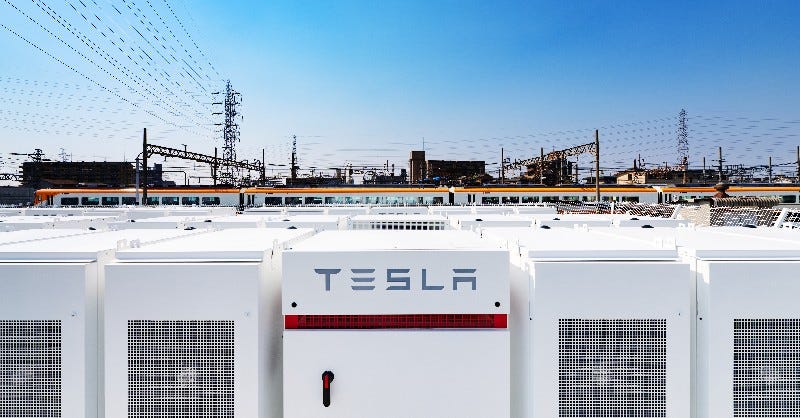
As we've seen [LW · GW] with SpaceX, Elon Musk is a master of running a company according to a definite multi-decade strategy. In his 2006 post, The Secret Tesla Motors Master Plan (just between you and me), he lays it out like this:
Build sports car. Use that money to build an affordable car. Use that money to build an even more affordable car. While doing above, also provide zero emission electric power generation options.
From our current perspective 13 years later, we can see that Musk accurately predicted the future by building it:
- Tesla built home solar panels and Powerwall to enable a home to run entirely on solar energy by collecting sporadic bursts of sunlight and releasing the energy later when it's needed. They also provide industrial-scale solar energy production and storage.
- Tesla built Gigafactory 1, the biggest battery factory in the world, to provide batteries for its electric vehicles and Powerwalls. Ok, it's actually bigger than all other battery factories in the world combined... ok, it's actually the biggest building in the world in terms of floor space... you get the idea.
- After building the Roadster (a $100,000 sports car) and Model S (a $75,000 "affordable car"), Tesla built the Model 3, an all-electric luxury sedan that retails at $35,000 USD whose sales completely dominated the Small + Midsize Luxury Cars category in December 2018.

I recommend this incredible WaitButWhy post for a deeper dive into Tesla.
Thiel writes:
A business with a good definite plan will always be underrated in a world where people see the future as random.
This is basically why I'm currently holding a significant amount of Tesla stock. (Plus I think that markets generally don't price in the degree of demonstrated product and engineering excellence.)
What About Cap And Trade?
When I started thinking about how to solve climate change, the first thing that popped into mind is what I tweeted a couple months ago:
The economy is this amazing system we have for balancing all the stuff we care [LW · GW] about without guilting anyone into righteous sacrifice. Just internalize the CO2 externality into the economy.
While Project Drawdown purposely doesn't include Cap and Trade in their list—
We do not model incentive-based policies and financial mechanisms, such as carbon and congestion pricing, because they would be guesses, not models.
—it sure seems like cap and trade would go a long way toward solving the problem: It incentivizes greenhouse gas emitters to reduce emissions, it incentivizes private investment in frontier tech to reduce atmospheric CO2, and it incentivizes a bunch of other creative stuff like private efforts to destroy HFC refrigerants.
President Obama tried to get congressional approval for a version of Cap and Trade, but he couldn't. President Trump doesn't seem to care for it either. So when it comes to an economic-policy solution for climate change, the world's largest economy is currently doing nothing.
Indefinite Climate Change Solutions
We’ve seen a bunch of definite ways people can help get closer to solving climate change:
- Work for Tesla
- Work on any of the areas in Bret Victor’s list
- Build a company or do research under Y Combinator’s Request for Carbon Removal Technologies
- Work on a political campaign to support Cap and Trade and other pro-environment policies
- Donate to Project Drawdown or any other organizations where you can understand the specific causal chain from their work to a better climate
But what does indefinite thinking about climate change look like? For most people, climate change is a very indefinite thing:
- They can’t summarize the problem like I did in the beginning of this post
- They can’t name any of the specific actions above that they can take to help solve climate change
- And to make things worse, they focus on the most useless thing: personal behavior change
Personal Behavior Change
I just Googled for "reduce carbon footprint" to grab a ridiculous example of personal behavior change advice. The top result I got is The 35 Easiest Ways to Reduce Your Carbon Footprint by Columbia University's Earth Institute.
Some of the recommendations are just good advice with no downside:
8. Wash your clothing in cold water. The enzymes in cold water detergent are designed to clean better in cold water. Doing two loads of laundry weekly in cold water instead of hot or warm water can save up to 500 pounds of carbon dioxide each year.
Okay if the enzymes in cold water detergent are designed to clean better in cold water, why not!
But most of the recommendations are asking you to make tradeoffs without acknowledging the downside:
12. If you're in the market for a new computer, opt for a laptop instead of a desktop. Laptops require less energy to charge and operate than desktops.
Wait, if you were going to buy a desktop computer, opting for the same-priced laptop instead will probably get you a noticeably slower machine. They should acknowledge these kinds of cost/benefit tradeoffs. But that's not even the biggest problem I have with personal behavior change recommendations.
The biggest problem with personal behavior change is that it naively feels like definite thinking, but it’s actually vague indefinite thinking, because your causal model of how your actions will affect greenhouse gas concentrations is missing the concept of an economic equilibrium.
Our economy, a free-market economy without Cap and Trade, is a classic tragedy of the commons. A low-greenhouse-gas atmosphere is the commons, and opting for a laptop instead of a desktop (or driving less, or buying less stuff, or eating less meat) is the equivalent of restraining your cows from grazing. It just doesn’t make game-theoretic sense.

When you unilaterally dial back your CO2 emissions a certain amount, it means other actors (people, companies and the government) can get away with that same amount of not dialing back theirs, and they’ll act on that incentive. There needs to be an actual coordination mechanism to solve the problem — you know, the kind of thing government is for.
I've summarized my thoughts about personal behavior change in two tweets:
To end homelessness, should we all give more spare change? To fix the US budget deficit, should taxpayers voluntarily pay higher taxes? Individuals buying carbon offsets is the same flawed logic. The equilibrium movement of a complex system is not a sum of these local nudges.
If stealing were legal, the solution would be law change, not charity to offset theft. Similarly, our economy lets everyone emit carbon for free. Individuals voluntarily offsetting small amounts of carbon is not an effective response to this situation.
When people bring up personal behavior change as a solution to climate change, this is my reaction:
Steve: I should eat less meat because farm animals contribute to climate change!
Liron: Don't bother; for every animal you don’t eat, I’m going to eat three. By the way, did you know Tesla is hiring?
Steve doesn’t feel guilty that he’s contributing to the budget deficit by only paying the minimum taxes that he owes, so we know he understands economic equilibrium dynamics in that domain. I’m trying to do Steve a favor in this domain by tearing his focus away from personal behavior change, and pointing him toward a specific course of action (joining Tesla) that can actually add up to a complete solution even once you zoom out and factor in everyone's economic incentives.
"Offsetting" Your Own Impact
What about "offsetting" your own impact by paying an organization to reduce a certain amount of greenhouse gas from the atmosphere on your behalf, i.e. buying carbon credits?
But I put "offsetting" in scare quotes because I don't think it's accurate to say that having an individual pay to prevent one ton of CO2 emissions in one place reduces the system equilibrium amount of greenhouse gas emission by one ton of CO2, or even necessarily half a ton. Similarly, I don't think taxpayers voluntarily paying an extra $1k/yr in taxes will actually reduce the budget deficit by $1k/yr/taxpayer. In both cases, some other actor in the system will be getting incentivized to emit more CO2 or to budget for more government spending.
When you just think about one person paying to plant a few trees, it's hard to imagine how the system equilibrium will bounce back against this perturbation. So let's break it down into two possible models: the government-oversight model and the no-government-oversight model.
The Government-Oversight Model
Consider the situation if the US Government were committed to hitting the Paris Agreement target emissions levels each year [graph source]:
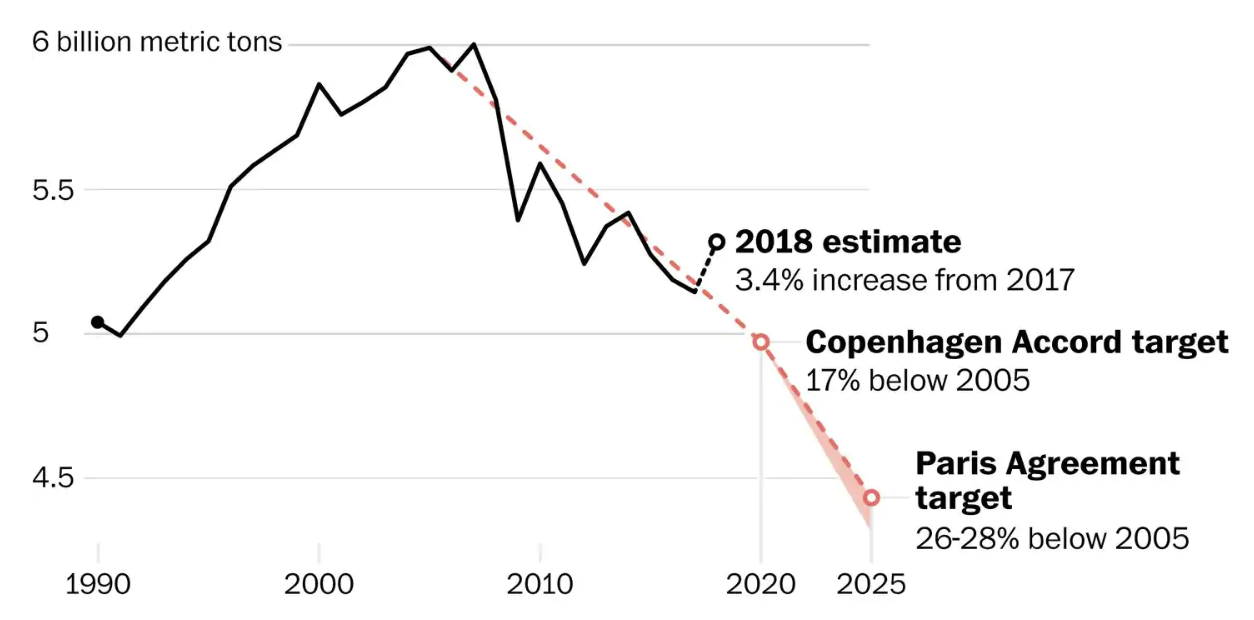
In this model, private citizens voluntarily paying to reduce carbon emissions is pointless because it's like paying taxes—everyone already has to do it. Perhaps it's already part of federal discretionary spending, or maybe a Cap and Trade policy has already priced carbon emissions into the goods and services we buy.
Ah, but what if an individual US citizen desires to beat the Paris Agreement targets? Even then, it's tricky to do it by purchasing "offsets". The effect of purchasing "offsets" will depend on the specific government-oversight model of the country where you intervene. For example, if you plant an extra tree in Country X, then you may cause Country X's companies to be allowed to emit more carbon that year.
The No-Government-Oversight Model
Consider the situation where the US Government doesn't bother limiting greenhouse gas emissions, a good approximation of the current Trump administration. The action of a few citizens to offset carbon won't move the needle in solving the climate crisis, until the point where enough citizens are donating that their combined political will can change government policy. So in this model, "offsetting" also has less impact than all the other specific climate change solutions discussed in this post.
Wren is a for-profit startup that launched a few months ago as part of Y Combinator's Summer 2019 batch (not part of YC's Request for Carbon Removal Technologies).
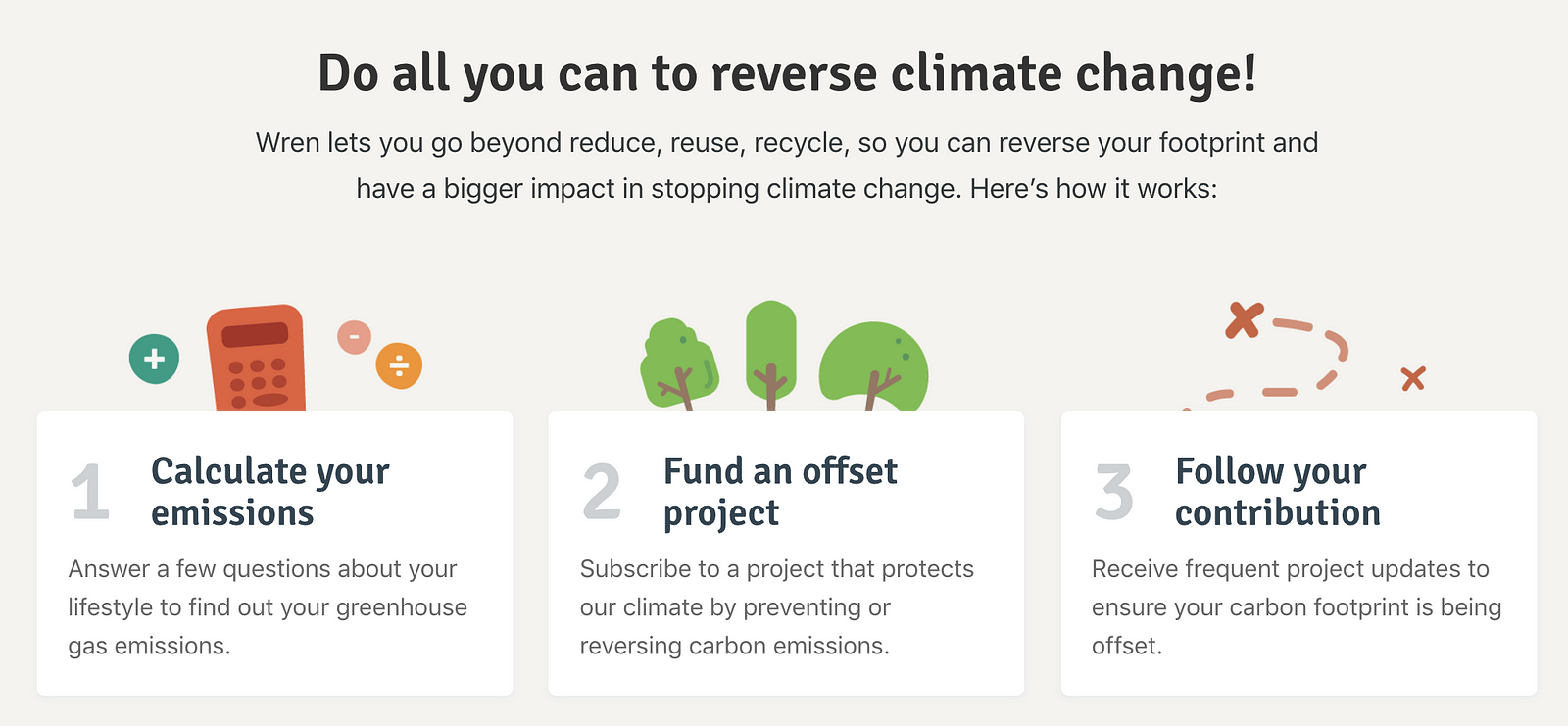
Wren charges about $24/month for the average American to "offset" their carbon footprint.
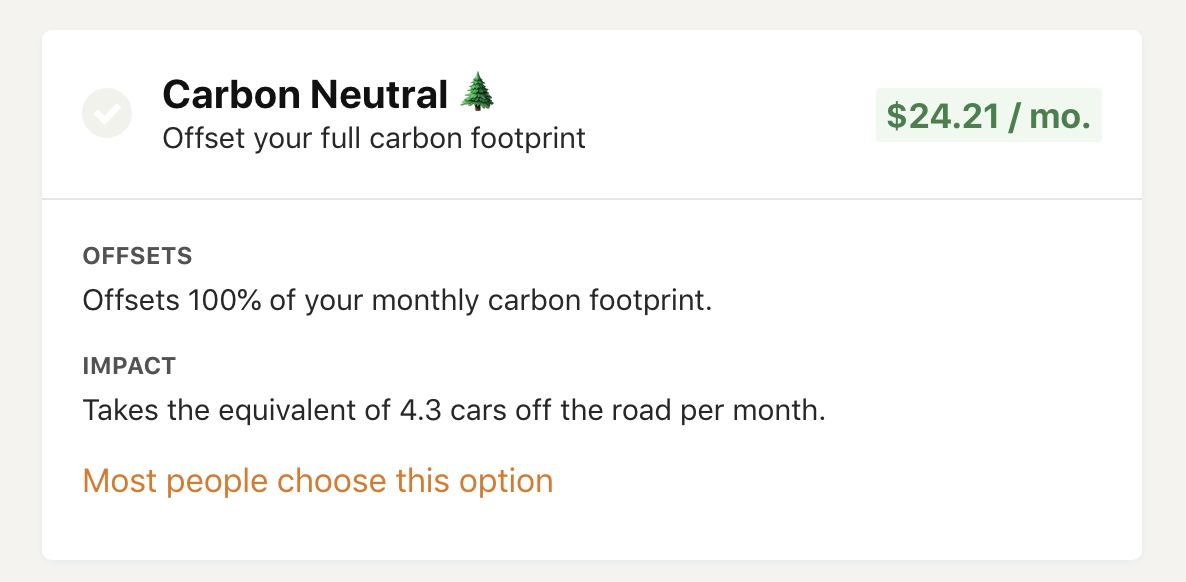
What's the definite future here? What's the specific causal link between Wren's actions and climate change getting solved? Presumably it's that if a significant fraction of Americans pay $24/month ($288/yr), then the US's net carbon emissions will be a lot lower, and then the US could meet its Paris Agreement targets.
If every American adult were a member of Wren, this should be sufficient to offset the whole US's climate change, and that implies a cost of only $288/yr x $250M = $72B/yr to offset all Americans' carbon.
But consider this cost estimate from Washington governor and former 2020 presidential candidate Jay Inslee's 100% Clean Energy for America Plan (which Massachusetts senator and still-presidential-candidate Elizabeth Warren now endorses):
Climate change cost the U.S. economy at least $240 billion per year during the past decade, and that figure is projected to rise to $360 billion per year in the coming 10 years. We cannot afford the cost of inaction.
If the US only cared about economic self-interest, not solving climate change per se, it's apparently worth paying at least $240B/yr to solve the problem.
So something feels very indefinite to me about Wren's approach to the problem, and "offsetting" carbon in general. If the specific projects Wren funds are such obvious slam dunks, isn't it faster to build up enough political support for a $72B/yr expenditure, rather than collecting it from individuals paying $288/yr at a time?
On the plus side, I'll admit that "offsetting" your own carbon footprint is at least a better option than personal behavior change, for the same reason that lawyers help more by donating to soup kitchens than by volunteering at them. "Offsetting" does let you direct money, the unit of caring [LW · GW], toward solving climate change. It's just that buying individual units of carbon removal is a bad deal because the system-level effect comes out to be so much weaker than an indefinite thinker imagines.
Activating your specificity powers to solve climate change means directing your resources toward efforts that have a systemically definite model of how they actually help. So while this was largely an object-level post about how to solve climate change, I hope it was also a good meta-level demonstration of the power of specificity.
Next post: The Power to Understand "God" [LW · GW]
32 comments
Comments sorted by top scores.
comment by johnswentworth · 2019-09-12T21:03:38.071Z · LW(p) · GW(p)
Why is the UNFCCC and the Paris agreement under "definite" solutions? That seems like a textbook case where specificity was completely lacking - there wasn't any actual plan for how any particular signatory would actually hit their targets, or any concrete plan for what would happen when if they didn't. It was all indefinite: they all agreed to somehow reduce emissions, without any definite vision.
On the other hand, personal behavior change like washing laundry in cold water is plenty specific and definite - the strategy says exactly what to do and has a simple cause-and-effect story from actions to results. The story may be wrong, but that doesn't make it any less definite - just because a model doesn't match reality does not mean that it's lacking specificity. (On a side note, I'm not entirely convinced by your economic argument, although I'm unimpressed with personal behavior change strategies for other reasons [LW · GW]. But again, all of that is orthogonal to specificity.) Same with offsetting: there's an argument to be made that something is wrong with the strategy, but the problem is orthogonal to specificity/definiteness.
More generally, I feel like this sequence has been losing sight of the target (although your writing skills in themselves are great). The central point of the sequence, as I see it, is using specificity to notice when our models don't have any gears [LW · GW] in them - that's a useful skill which applies in huge variety of areas, and you're doing a decent job providing lots of examples. But specificity, like gears-y-ness, is not the only criteria for having a correct model. It's independent of whether the specific examples are realistic, or of whether the model matches reality. The central message of specificity would be more effectively conveyed if the examples clearly separated it from correctness. "Specificity" is not just another synonym for "yay".
Replies from: Liron↑ comment by Liron · 2019-09-12T21:41:42.050Z · LW(p) · GW(p)
Why is the UNFCCC and the Paris agreement under "definite" solutions? ... It was all indefinite: they all agreed to somehow reduce emissions, without any definite vision.
Because at least having a world organization that sets per-country targets is what the start of a definite solution looks like.
On the other hand, personal behavior change like washing laundry in cold water is plenty specific and definite - the strategy says exactly what to do and has a simple cause-and-effect story from actions to results.
While the link "wash clothes > reduce your personal carbon footprint" is definite, my point is that the category of solutions that rely on the link "reduce your personal carbon footprint > solve carbon change" are indefinite.
I'm unimpressed with personal behavior change strategies for other reasons [LW · GW].
Nice, yeah me too
Same with offsetting: there's an argument to be made that something is wrong with the strategy, but the problem is orthogonal to specificity/definiteness.
I still think it's a problem of indefiniteness when people treat personal behavior change or personal carbon offsetting as part of a solution to the current crisis.
I feel like this sequence has been losing sight of the target ... The central message of specificity would be more effectively conveyed if the examples clearly separated it from correctness.
I take your point, and I'll probably go back after I finish the series and move out the content that's less helpful to understanding specificity. I'd like the series to be a reference that people can link others to when they find themselves repeatedly asking the others to be more specific.
Replies from: Kenny↑ comment by Kenny · 2019-09-19T00:29:38.470Z · LW(p) · GW(p)
While the link "wash clothes > reduce your personal carbon footprint" is definite, my point is that the category of solutions that rely on the link "reduce your personal carbon footprint > solve carbon change" are indefinite.
I'm not seeing much difference in 'definitedness' between personal behavior change and "world organization that sets per-country targets" unless it's just that solving global warming necessarily must involve global government. I think there are a LOT more examples of even 'intra-country targets' , for anything (not global warming), being effectively bullshit compared to examples of the opposite. I'm thinking of things like (the U.S.) The War on Drugs, but drug prohibition generally seems to fit pretty well.
And more generally, a lot of 'government' solutions seem to be pretty indefinite. It's a depressingly common feature of government. (And of course governments do implement definite specific policies too, so it's not an inevitable failure.)
Replies from: Liron↑ comment by Liron · 2019-09-19T00:51:47.288Z · LW(p) · GW(p)
I'm not seeing much difference in 'definitedness' between personal behavior change and "world organization that sets per-country targets" unless it's just that solving global warming necessarily must involve global government.
Yes, I think some minimal level of global coordination may be necessary, and is very likely to play a significant causal role in the eventual outcome. For example, I think the US should feel more comfortable investing in a certain amount of carbon emissions reduction/sequestration knowing that other countries are officially supposed to also do their part.
In contrast, whether individuals focus any effort on reducing their footprint outside of their main system of economic incentives is definitely not going to have a causal role on the outcome.
comment by Richard_Ngo (ricraz) · 2019-09-12T20:02:43.399Z · LW(p) · GW(p)
This post says interesting and specific things about climate change, and then suddenly gets very dismissive and non-specific when it comes to individual action. And as you predict in your other posts, this leads to mistakes. You say "your causal model of how your actions will affect greenhouse gas concentrations is missing the concept of an economic equilibrium". But the whole problem of climate change is that the harm of carbon emissions affects the equilibrium point of economic activity so little. You even identify the key point ("our economy lets everyone emit carbon for free") without realizing that this implies replacement effects are very weak. Who will fly more if I fly less? In fact, since many industries have economies of scale, me flying less or eating less meat quite plausibly increases prices and decreases the carbon emissions of others.
And yes, there are complications - farm subsidies, discontinuities in response curves, etc. But decreasing personal carbon footprint also has effects on cultural norms which can add up to larger political change. That seems pretty important - even though, in general, it's the type of thing that it's very difficult to be specific about even for historical examples, let alone future ones. Dismissing these sort of effects feels very much like an example of the "valley of bad rationality".
Replies from: greylag, Liron↑ comment by greylag · 2019-09-12T20:30:46.930Z · LW(p) · GW(p)
me flying less or eating less meat quite plausibly increases prices
That does not sound very plausible, but what DOES is if you then find yourself in the market for long distance rail travel, or meat substitutes (vegetarian meals in restaurants) (because the market for low impact substitutes is smaller than the conventional market, so your effect there is greater).
↑ comment by Liron · 2019-09-12T20:17:56.992Z · LW(p) · GW(p)
You even identify the key point ("our economy lets everyone emit carbon for free") without realizing that this implies replacement effects are very weak. Who will fly more if I fly less? In fact, since many industries have economies of scale, me flying less or eating less meat quite plausibly increases prices and decreases the carbon emissions of others.
It only has weak replacement effects in the "non-government-oversight model". My claim is that if we're in that model, then ROI of efforts toward coordination, or else end-runs like technological progress, dominates ROI of offsetting efforts.
But decreasing personal carbon footprint also has effects on cultural norms which can add up to larger political change.
That view is what I claim is indefinite and problematic.
That seems pretty important - even though, in general, it's the type of thing that it's very difficult to be specific about even for historical examples, let alone future ones. Dismissing these sort of effects feels very much like an example of the "valley of bad rationality".
Well the crux is that I think you're describing a situation (personal behavior change -> cultural norm shift -> meeting Paris Agreement target) that won't actually happen, and specificity is a valuable tool to pinpoint why not.
Replies from: greylag↑ comment by greylag · 2019-09-12T20:45:30.481Z · LW(p) · GW(p)
cultural norm shift -> ... meeting Paris Agreement target
I don’t think this chain of causes and effect can be ruled out a priori.
Before the Copenhagen agreement banned CFCs, there were activists boycotting aerosol cans! Tesla (and, before them, Toyota, makers of the Prius) benefitted greatly from buyers’ guilty consciences! (And that’s a good thing!) Wind energy was expensive and countercultural in the 70s; hippies did early R&D!
Replies from: Liron↑ comment by Liron · 2019-09-12T20:59:11.242Z · LW(p) · GW(p)
There's another weak link in identifying "people paying for an indefinite solution to a problem" with "cultural norm shift". Tesla's master plan didn't need to have any such "BS steps". I prefer if we don't have to start modeling the psychology of whether it helps society when people are kidding themselves in a certain way, instead of just definitely steering toward where we need to go.
comment by Liron · 2019-09-13T03:11:54.428Z · LW(p) · GW(p)
Shopify announced today that they’re taking definite action on solving climate change by creating a $1-5M fund to buy carbon removal/sequestration at any price, which basically works as a prize.
https://news.shopify.com/we-need-to-talk-about-carbon
So now Y Combinator is funding sequestration startups and Shopify is giving them a path to profitable return on investment. This is what a definite solution looks like.
comment by greylag · 2019-09-12T20:25:35.956Z · LW(p) · GW(p)
What you want, as someone taking action against climate change, is ... to be applying pressure somewhere it will have an effect. I want to say “leverage”, but I’m not sure that’s the right concept - let me give an example: funding renewable energy sources that are on a steep segment of their learning curve. The fact that I did this makes the next person who does this’s action more effective.
I think this article mostly implies, rather than flat out states, that there is a coordination problem here, which means, in approximate order: a) political action b) if you’re taking personal action (what you buy, who you work for, ...) you want to be pushing down a steep and oiled learning curve for maximum effect
I think a lot of activist discourse about climate avoids talking about coordination simply because of the likelihood that the reader feels powerless and becomes apathetic. (“Don’t go over there, you’ll fall into the despair event horizon!”)
Replies from: Lironcomment by steven0461 · 2019-09-13T21:37:21.744Z · LW(p) · GW(p)
We're predicting it to be as high as a 6°C warming by 2100, so it's actually a huge fluctuation.
6°C is something like a worst case scenario.
Replies from: Liron
↑ comment by Liron · 2019-09-13T21:57:33.592Z · LW(p) · GW(p)
I know that's what a lot of people refer to it as, but I felt that the word choice "worst case scenario" is a bit too optimistic-sounding about how low the probability is, because I believe modelers give it more than a 10% chance of being the outcome without a lot of climate removal/sequestration/reversal efforts.
Replies from: steven0461↑ comment by steven0461 · 2019-09-15T17:38:39.211Z · LW(p) · GW(p)
Even if you assume no climate policy at all and if you make various other highly pessimistic assumptions about the economy (RCP 8.5), I think it's still far under 10% conditional on those assumptions, though it's tricky to extract this kind of estimate.
comment by ryan_b · 2019-09-13T17:02:57.910Z · LW(p) · GW(p)
It's probably worth emphasizing the huge challenges involved in trying to get a coordination process to output something highly specific. This is enough of a problem to start with using specificity to privately evaluate start-ups; how to get from there, through governments, and then through international relations to a highly specific treaty is a good candidate for the most complicated possible task.
Replies from: Liron↑ comment by Liron · 2019-09-13T21:59:01.424Z · LW(p) · GW(p)
I agree, that's why I put the UNFCCC in the "definite" category, because I think they've added an important definite piece to the overall solution, and I don't think we should expect too much more out of them besides setting ballpark country-specific targets.
comment by romeostevensit · 2019-09-13T14:23:09.919Z · LW(p) · GW(p)
>Peter Thiel's smart and highly original book
A lot of it struck me as incredibly similar to Edward de Bono's material from the 70's and 80's albeit applied to startup memes, which is still valuable.
Replies from: Liron
↑ comment by Liron · 2019-09-13T15:04:08.102Z · LW(p) · GW(p)
Ah, if you have a relevant excerpt handy I'll check it out. But ya Thiel's book seems like an outlier in the space of contemporary writing about startups.
Replies from: romeostevensit↑ comment by romeostevensit · 2019-09-13T18:07:33.185Z · LW(p) · GW(p)
Don't have it on hand but noticeably condensed in Sur/Petition.
comment by Joshua Mack (joshua-mack) · 2021-02-11T15:21:46.442Z · LW(p) · GW(p)
I like motorcycles, therefore i want to point them out. In the EU, they are a luxury fun vehicle for the most part. Still it is amazing how they are thoroughly ignored. The german publicly funded media as per Rundfunkstaatsvertrag is supposed to help people make up their own mind, however the fact that a sub300kg vehicle is probably more efficient in single person transport than a 1200+kg one is mostly held under wraps, motorcycles are only mentioned when it is about noise and speed. The climate movement, fridays for future, also does not seem to think about this at all. Sure safety is a point, i would have counterpoints, as in it being an infinite argument, a tank is also safer than a car, but however you feel about it, even people that pretend to be very radical about doing something about climate change do not even advocate for 125cc motorcycles. The propaganda is pretty effective.
comment by dreeves · 2019-10-21T23:28:53.669Z · LW(p) · GW(p)
Really good points. It's funny, I have a draft of a similar point about personal behavior change that I tried to make as provocative-sounding as possible:
http://doc.dreev.es/carbonfoot (Trying To Limit Your Personal Carbon Footprint Hurts The Environment)
But note the PS where I suggest a counterargument: making personal sacrifices for climate change may shape your identity, drive you to greater activism, and make your activism and climate evangelism more persuasive (to those who don't appreciate the economics and game theory of it).
Replies from: Liron↑ comment by Liron · 2019-10-24T17:33:24.912Z · LW(p) · GW(p)
Yep I'm sympathetic to your post. As for the counterargument, I have two rebuttals:
1. I would agree if we were talking about e.g. money-limited people donating small token amounts to effective charities to build their identities, but "one who limits personal carbon footprint outside of a strategy to stop global warming" isn't even an identity people should want :)
2. Even if we give up on talking about strong causal mechanisms and just talk about weak effects of one's carbon-footprint-reduction efforts like "raising awareness of the issue", there's also the self-licensing effect where people are satisfied to think of themselves as a good person after just taking one or two actions, so actions that don't help can drive out actions that would have helped.
comment by jmh · 2019-09-14T13:26:16.244Z · LW(p) · GW(p)
I'm finding this post difficult. The main reason I think is that the most focuses on controlling the temperature change rather than focusing on the results of temperature change and identifying the resulting problem.
Both provided links are nearly mute on that question, providing a short paragraph without further discussion or support.
NASA:
The impact of global warming is far greater than just increasing temperatures. Warming modifies rainfall patterns, amplifies coastal erosion, lengthens the growing season in some regions, melts ice caps and glaciers, and alters the ranges of some infectious diseases. Some of these changes are already occurring.
Tomorrow:
A couple of degrees change in the average yearly temperature is far from a minor event. When Earth"s temperature was 5°C lower, the sea level was 120m lower and all of Northern Europe and Canada were covered by a gigantic ice cap (one could hike from Vermont to Greenland). Furthermore, average temperatures do not tell the whole story. As average temperatures increase, the likelihood of extreme temperature events might increase as well.
A change of a couple of degrees over the surface of the Earth first causes the oceans to absorb the extra heat. In the process, they expand (raising the sea level) and cause increased evaporation, which leads to perturbed air and water currents. This yields an increased likelihood of extreme weather events, such as drought, hurricanes or floods. This is already observed as e.g. coral reefs are starting to die.
Longer term effects are harder to quantify as a temperature change this sudden has never been witnessed in the past. To get an rough idea, this map shows what the world will look like 4° warmer while this article shows how sensitive birds and bees are to climate change. Furthermore, higher temperatures and more extreme weather causes crops to fail which will force refugees to flee inhabitable regions.That's ultimately bad for the economy.
The NASA statement seem, in most cases ambiguous. Changing rain patterns may be good, may be bad and the assessment probably depends on where you are. Lengthening growing seasons seems like a good thing -- we can feed more people, food maybe gets cheaper to produce and so cheaper to buy? I would like to know more about the affects of coastal erosion -- I don't believe it is one sided and always detrimental.
Tomorrow offers more but also includes more "weasel" terms -- might be, hard to quantify....
Additionally, another NASA link (found when looking for how temperatures are estimated for the past when we don't have recorded data) indicated 65 million years back temperatures were 10 - 15 degrees C higher. Life certainly seems to have been flourishing back them.
So, what specifics should be be looking at here. Seems like we're jumping on the "stop the warming" train without considering the benefits to warming and then considering the better approach might well be to accept higher temperatures (so it doesn't matter the cause really) and develop the technologies that are consistent with the evolving environment. Or more likely, some middle ground -- there are lots of reasons to limit emissions unrelated to temperature rising.
I just don't get why I really need to care about the average temperature as the main focus of either problem or solution. This is much more complicated than that and all the specifics here seem to cast as much shadow as light.
Replies from: Liron↑ comment by Liron · 2019-09-14T19:31:48.827Z · LW(p) · GW(p)
This post focuses on greenhouse gas concentrations. Since the causal model is (greenhouse gas concentrations) -> (temperature plus the other stuff you mention), I figure the highest-leverage way to solve climate change is to lower greenhouse gas concentrations.
comment by Pattern · 2019-09-12T20:20:39.262Z · LW(p) · GW(p)
(I consider it ironic that Thiel's Founders Fund has an investment in Golden, but it was a relatively small amount and unrepresentative of their normal decision-making.)
Golden's plan* was something like 'better than wikipedia'. Your past disagreement seemed to stem from the belief that:
- they didn't have a plan to achieve that plan*, or
- their plan to achieve that plan* was subpar, or
- they didn't have a plan. They had a goal.
comment by paul ince (paul-ince) · 2019-09-13T01:23:44.105Z · LW(p) · GW(p)
This has really triggered me and I am only up to the dot points. Although I have thoroughly enjoyed the specificity articles to date I cannot continue with this one with it being based on dodgy information from the outset.
From the first sentence;
'Most people', can you define most? As a portion of the earth's population I think 'some' would be more accurate.
'agree that climate change', I will assume you mean man-made climate change because changing how cosmic rays interact with our atmosphere is very much more difficult to influence than how much man produced carbon goes into the atmosphere, which is hard enough on its own.
'is a big problem we should be solving,' I don't agree with this either (surprisingly). If you had said "is a big problem that requires understanding' i would have been more happy.
'but couldn't tell you what specifically "solving climate change" means', I think this mainly comes down to a poorly defined problem. A couple of degrees of warming would actually be nice for people who's farm freeze solid every year. A couple of degrees of warming would actually be nice for reducing the thousands of deaths of people who can't afford to heat their homes (off the top of my head I think it was 50 000ish in Europe last winter)
The graph you have included next is the best example of a texas sharp shooter fallacy I have ever seen. Compare 10000 years of data to a cherry picked average of 19 of those years, cmon really? Seriously, this is the foundation?
The dot points
Earth's average temperature has shot up by 1°C in the last 50 years.
How is this a problem that needs solving even if it is accurate? Which I doubt anyway due to the cherry picked nature of the information so far.
The causal link from greenhouse gas emissions to Earth's rising temperature has been well established.
This is actually the most controversial part of the whole debate. If it were established you would be able to find a model that modelled it. Best of luck with that.
On a 1M-year timescale, Earth's temperature has been fluctuating plus or minus a few degrees tops, so this 1°C change is a big fluctuation.
This is flat out wrong. I didn't even have to go to a sceptic site for this graph. https://en.wikipedia.org/wiki/Global_temperature_record#/media/File:EPICA_temperature_plot.svg
We're predicting it to be as high as a 6°C warming by 2100, so it's actually a hugefluctuation.
Oh, come on. Al Gore's hockey stick was debunked years ago.
When I get time I will probably read through. I am going to have work really hard on my biases before I do. It will be interesting, I suppose, to see how you solve a problem you have not defined/defined erroneously.
comment by bastnerd · 2019-09-23T21:52:04.866Z · LW(p) · GW(p)
I honestly dont get how everyone always argues that there'll be startups that somehow suck carbon out of the atmosphere, while at the same time we absoluty fail at even reducing emissions. The kind of energy you'd need for sucking carbon out of the atmosphere would be better invested in just instantly stoppig putting even more in it. If world it on zero or almost zero carbon emission, then its time for reversing and fixing. For me that kind of thinking feels like plain ignorance about thermodynamics.
Same goes for the whole "new green deal" movement. You can't really undock GDP from carbon emission. It's gonne be a painful peak downards in luxury and living standard, especially for first world countrys if we really want to stop falling off the cliff.
Also I want to add that 2° ist already a coin toss whenever or not civilisation as a whole will collapse so it's in my opinion insane to declare this as a valid goal.
All in all I think we seriously underestimated this problem, its very likely to drive humanity extinct and we should start acting according to it. To follow your point for me that'd be making policital pressure like crazy and never stop telling people that we're literaly all gonna die if we keep going like we do.
At this point I for myself am seriously think if the best course of action is building an complete self-sufficient village somewhere in canada or russia (and therefor resettle with my whole familiy across the ocean in the next 5 years) where climate apokalypse won't be as harsh or just say, "Nah doesn't matter anyway, I'll just start hedonism as much as I can and be sure I have a bullet for my head around when 2050 nears."